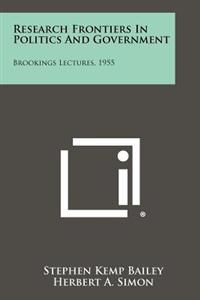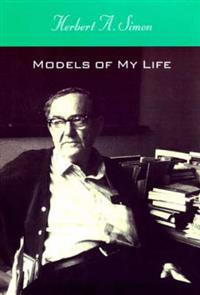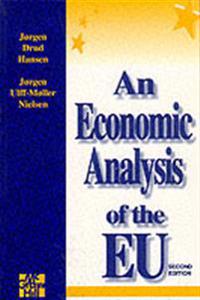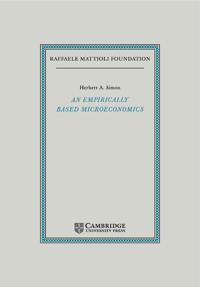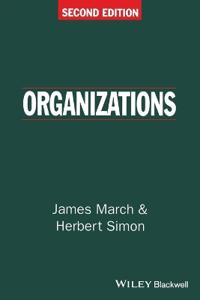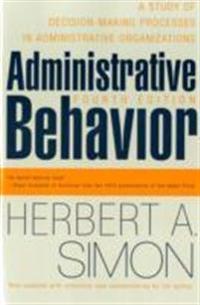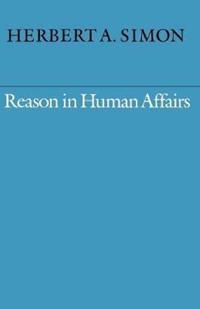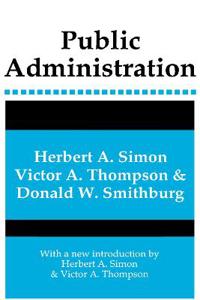Research Frontiers in Politics and Government: Brookings Lectures, 1955 (Häftad)
avStephen Kemp Bailey, Herbert A. Simon, Robert A. Dahl
ISBN: 9781258382100 - UTGIVEN: 2012-06Protocol Analysis: Verbal Reports as Data (Övrig)
avK. Anders Ericsson, Herbert A. Simon
ISBN: 9780262550239 - UTGIVEN: 1993-06-01Since the publication of Ericsson and Simon's ground-breaking work in the early 1980s, verbal data has been used increasingly to study cognitive processes in many areas of psychology, and concurrent and retrospective verbal reports are now generally accepted as important sources of data on subjects'[...]
Scientific Discovery: Computational Explorations of the Creative Processes (Pocket)
avPat Langley, Etc., Herbert A. Simon, Gary L. Bradshaw, Jan M. Zytkow
ISBN: 9780262620529 - UTGIVEN: 1987-01-01Models of My Life (Häftad)
avHerbert A. Simon
ISBN: 9780262691857 - UTGIVEN: 1996-11In this candid and witty autobiography, Nobel laureate Herbert A. Simon looks at his distinguished and varied career, continually asking himself whether (and how) what he learned as a scientist helps to explain other aspects of his life.A brilliant polymath in an age of increasing specialization, Si[...]
The Sciences of the Artificial (Häftad)
avHerbert A. Simon
ISBN: 9780262691918 - UTGIVEN: 199610Continuing his exploration of the organization of complexity and the science of design, this new edition of Herbert Simon's classic work on artificial intelligence adds a chapter that sorts out the current themes and tools -- chaos, adaptive systems, genetic algorithms -- for analyzing complexity an[...]
An Empirically Based Microeconomics (Pocket)
avHerbert A. Simon
ISBN: 9780521118361 - UTGIVEN: 2009-08In his Mattioli Lectures, Nobel Laureate Professor Herbert A. Simon directs attention to the kinds of empirical research that are necessary for progress in microeconomics. He traces the development of neoclassical economic theory and its gradual retreat from empiricism to abstraction. He then discus[...]
Organizations (Pocket)
avJames G. March, Herbert A. Simon, James G. March
ISBN: 9780631186311 - UTGIVEN: 199306This new edition places the material in its contemporary context, whilst still preserving the 1958 text. It examines such concepts as bounded rationality, satisficing, inducement/contribution balances, problem solving and uncertainty absorption. The text also explores organization theory, decision m[...]
Administrative Behavior (Pocket)
avHerbert A. Simon
ISBN: 9780684835822 - UTGIVEN: 199703In this fourth edition of his ground-breaking work, Herbert A. Simon applies his pioneering theory of human choice and administrative decision-making to concrete organizational problems. To commemorate the fiftieth anniversary of the book's original publication, Professor Simon enhances his timeless[...]
Herbert A. Simon (Inbunden)
avHunter Crowther-Heyck
ISBN: 9780801880254 - UTGIVEN: 2005-03Rarely does the world see as versatile a figure as Herbert Simon. A Nobel laureate in economics, he was an accomplished political scientist, winner of a lifetime achievement award from the American Psychological Association, and founder of the Department of Computer Science at Carnegie Mellon Univer[...]
Reason in Human Affairs (Häftad)
avHerbert A. Simon
ISBN: 9780804718486 - UTGIVEN: 1983-06What can reason (or more broadly, thinking) do for us and what can't it do? This is the question examined by Herbert A. Simon, who received the 1978 Nobel Prize in Economic Sciences "for his pioneering work on decision-making processes in economic organizations." The ability to apply reason to the c[...]
Public Administration (Häftad)
avHerbert A. Simon
ISBN: 9780887388958 - UTGIVEN: 1991-09At the time of its initial publication, Public Administration helped to define this field of study and practice by introducing two major new emphases: an orientation toward human behavior and human relations in organizations, and an emphasis on the interaction between administration, politics, and p[...]
A History of Chile, 1808-2002 (Pocket)
avSimon Collier, William F. Sater, Herbert S. (EDT) Klein
ISBN: 9780521534840 - UTGIVEN: 2004-10A History of Chile chronicles the nation?s political, social, and economic evolution from its independence until the early years of the Lagos regime. Employing primary and secondary materials, it explores the growth of Chile?s agricultural economy, during which the large landed estates appeared; the[...]

